conscientious objector
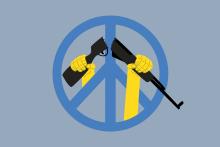
THE NUMBER OF asylum seekers from Russia arriving at the U.S. southern border has risen dramatically in the past year. Hundreds of thousands of Russians have left their homeland since President Putin ordered the invasion of Ukraine. Some fear increasing economic hardship and that Putin will impose martial law and close the borders, and some are fleeing to follow their conscience.
In September, the Kremlin announced its first military mobilization for soldiers to fight in Ukraine, prompting the departure of tens of thousands of Russian men. A second mobilization may occur this fall. Many of those who have fled hold religious or moral beliefs that tell them that participation in Russia’s invasion of Ukraine is wrong. Many young men have come to the United States seeking asylum as conscientious objectors (COs) based on their refusal to be drafted into Russia’s military for reasons of moral conscience.
At the Center on Conscience and War, we began hearing about these cases in fall 2022 — and found very few resources to support them. A handful of immigration attorneys are taking on a few of these cases, but the demand is much greater than the help available. This spring, our center initiated a Freedom of Information Act request to learn exactly how many of the asylum seekers are making claims based on conscientious objection to military conscription.
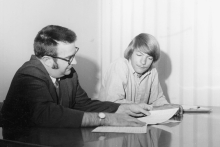
Duane Shank, a Mennonite peace activist, community organizer, and author, died on April 20 in Goshen, Ind., after two years in hospice. He was 70. The cause was complications from chronic obstructive pulmonary disease, according to his family.

IN MARCH, THE National Commission on Military, National, and Public Service sent recommendations to Congress for changes to the Selective Service System, the military draft. For people of conscience, the issues at the heart of our concern were the expansion of Selective Service and the draft and protection of the rights of conscientious objectors (COs). Conscientious objectors are defined by the Defense Department as those with “a firm, fixed, and sincere objection to participation in war in any form or the bearing of arms, by reason of religious training and/or belief.” Some consider draft registration to be participation in war and a violation of their conscience.
During the commission’s two years of public hearings and debate, religious communities and peace organizations advocated for the commission to recommend that the Selective Service System be put into deep standby, as it was between 1975 and 1980. Short of that, we advocated for a process for COs to make their objection to war known at the time of registration with a “CO check-off box.” The commission ultimately rejected that option, stating that though it “would probably require minimal expense,” it would cause “confusion, during a draft, for those who indicated their intent to file for conscientious objector status.”
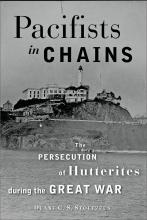
AS THE U.S. mobilized for World War I, a wave of patriotic fervor and xenophobia swept the country. Anything German was suspect, and those who were German-speaking and refused to fight against Germany were doubly suspect. Resentment and anger were directed at Anabaptist groups; several churches were burned and pastors beaten.
Inevitably, the demands of the state conflicted with the rights of conscience. Christian pacifists who only desired to be true to their beliefs by not serving in the military faced a militarized state that saw them as disloyal and disobedient. There was no legally recognized right to conscientious objection—if drafted, the only alternative for objectors was to go into the military and then refuse to participate.
Hutterite leaders had agreed that their young men would register, but if drafted and required to report for military service, their cooperation would end. They would refuse any orders making them complicit in war. Pacifists in Chains is the story of four young men—David, Michael, and Joseph Hofer, and Jacob Wipf—from the Hutterite colony in Alexandria, S.D., who faced that choice. Duane C.S. Stoltzfus, a professor at Goshen College in Indiana, was given access to previously unpublished letters from these men to their wives and families; the book is built around those letters.
Upon being drafted, the four reported in May 1918 and were sent to Fort Lewis, Wash. When they arrived, they immediately faced the test. Ordered to sign an “enlistment and assignment card” and line up as soldiers, they refused and were taken to the guardhouse. Following a brief court-martial, they were found guilty and sentenced to 20 years. Two weeks later, they were in chains and with armed guards on a train headed south to Alcatraz prison in the San Francisco Bay, then a military “disciplinary barracks.” Once there, they again refused to put on the uniform—in this case a military prison one—and were placed in solitary confinement in “the hole,” a basement dungeon. The cells seeped water and were infested with rats; the men were given bread and water to eat and subjected to beatings.
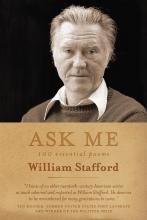
Miles of yellow wheat bend; their leaves / rustle away and wait for the sun and wind.
—From “A Farewell, Age Ten”
We wondered what our walk should mean, / taking that un-march quietly; / the sun stared at our signs—"Thou shalt not kill.”
—From “Peace Walk”
WILLIAM STAFFORD was a poet of the land and a conscience that fanned out over the land. Born in Hutchinson, Kan., 100 years ago—on Jan. 17, 1914—it was perhaps his early intimacy with space and sky that opened him to the mystery of human frailty.
At age 6, he saw two black students at his school being taunted by whites. He stood with them.
Another mystery: He who personifies the term national poet is largely unknown in his nation. Four new books (in his 79 years, Stafford published more than 50 books) published to coincide with his centennial might help redress this situation. Ask Me (Graywolf Press), from which the above excerpts are taken, brings to readers 100 “essential” Stafford poems dealing with his pacifism, his family, Native Americans, and the landscapes of his native Kansas and his adopted Oregon, where many centenary events are scheduled to take place.
What a relief it would be to dwell in [faith] communities where we acknowledge our shadows in a healthy acceptance of ourselves as containers of all the opposites! It may prove beneficial to be forced to face, daily, the humiliating fact that some of us are no less violent than those whose policies we oppose.
—Walter Wink, Engaging the Powers
I AM A conscientious objector, and I am drawn to violence. My attraction to violence is both innate and learned. When something frightens me, my hands clench into fists. When something angers me, I want to inflict pain upon that thing. But a person cannot inflict pain upon a thing, so I seek out those whom I deem responsible for said thing and my desire to inflict pain upon a thing morphs into a desire to do violence to another person. Since I was a child, I have fantasized about using violence to stop what I see as bad and thereby become good.
It is from this point—from these fantasies of righteous violence—that I begin this essay on my journey to principled nonviolence and conscientious objection. This is a story of change and choice, but it is not a story of transformation: I am who I have always been.
In fall 2012, I spent three weeks in Israeli military prison for refusing to enlist in the Israel Defense Forces. (Every Israeli citizen, except for the ultra-Orthodox and Palestinian citizens of Israel, must serve in the military.) My sentence was brief, but the process that brought me to the prison’s gates took almost a decade.
Joshua Casteel served as an interrogator in Iraq. Then an encounter with a Jihadist challenged him to truly live out his faith.
LATELY I’VE been reading my dead friend’s files. That’s how I know that he often typed in Cambria. That’s how I know that he drafted beginning-to-end, reworking early paragraphs before he set down the next—which is why so much of his writing just stops. That’s how I know that as a child he held press conferences in a White House made of cardboard boxes, wearing a clip-on tie, and that the night before he began school at West Point (a school he’d soon leave), he and his father smoked cigars on a hill overlooking the Hudson River, though his father did not like cigars. That’s how I know how much he thought about pain, which to Heidegger is “the rift,” a “separating that gathers,” and to Wittgenstein is “a having, not a knowing,” and to Elaine Scarry is an “objectless experience” that “destroys language.”
This thinking was for classes at the University of Iowa and the University of Chicago, and this thinking was for other people, namely prisoners and fellow soldiers in the War on Terror, which was also the Global War on Terrorism, and was the Iraq War and is still the War in Northwest Pakistan and the War in Afghanistan, a subset of which is “Operation Enduring Freedom,” and is also and continues to be World War III or World War IV, depending on how you count, and was once The War Against Al-Qaeda and is now the Overseas Contingency Operation, which has been tidily renamed CVE (Countering Violent Extremism).
Joshua Casteel was sent to the Long War after first enlisting in the Army Reserves as a high school junior in Cedar Rapids, Iowa. Seven years later he was stationed at Abu Ghraib prison as an interrogator and linguist. This is where he became convicted that he could no longer be an “American war fighter,” which he saw as treason against his “real kingdom and home.”

A woman who has lived legally in this country for more than 30 years was granted her request to become a naturalized United States citizen Thursday after initially being refused conscientious objector status because she is not religious.
Margaret Doughty, who came to the U.S. in 1980 from England, was informed by U.S. Citizenship and Immigration Services that unless she provided a letter from a church or a religious official by June 21 backing up her assertion that her “lifelong spiritual/religious beliefs” would prevent her from taking up arms for the U.S., her application would be denied.
Immigrants seeking citizenship must pledge to defend the U.S., unless they can prove they are conscientious objectors — people whose religious beliefs prevent them from engaging in war. Conscientious objector status has been awarded to Quakers, Buddhists, and others.
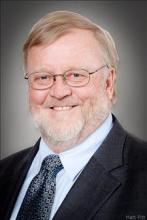
From Sojourners CEO Jim Wallis' eulogy at Scott Kennedy's funeral last weekend:
"Oh Lord, Lord, Lord…. This is a hard one.
You know why we are all gathered here today—Because Scott Kennedy, your good and faithful servant, has always brought us together—to do good things in the world: Necessary things, visionary things, courageous things, and often hard things. But they were things that must have warmed your heart, because they were the things that make for peace.
Jesus told us. ‘Blessed are the peacemakers, for they shall be called the children of God.’ And Scott brought us together, time and time again, to be those peacemakers and thus, really, to be your children—by doing what we were supposed to do.
And now, Scott is with you….and has likely heard you say something like, ‘Well done good and faithful servant.’ But we miss him terribly, and we weren’t ready for this. We just thought we would always have him.
Scott never brought us together for himself; it was never about him, but always about being peacemakers for the sake of other people. But today we gather for Scott. He has brought us together once again, and what a crowd it is—both here and online all around the world. We are all Scott’s peacemakers...."
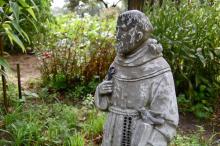
Today (Oct. 4) Christians around the world celebrate the life of St. Francis of Assisi, one of the bright lights of the church and one of the most venerated religious figures in history.
The life and witness of Francis is as relevant to the world we live in today as it was 900 years ago. He was one of the first critics of capitalism, one of the earliest Christian environmentalists, a sassy reformer of the church, and one of the classic conscientious objectors to war.
Recently, Wikileaks, an online whistleblower site, released a video which was dubbed "Collateral Murder." I write as a former member of the Infantry c
I've been thinking a lot about courage. See that fresh-faced, bold young woman on the right? Her name is Raz Bar-David Varon. She's an 18-year-old Israeli who just graduated from 12th grade. And as I write this, she's sitting in jail in Tel Aviv because she refuses to join the Israeli army.
If no one speaks out, the violence is going to continue. Someone has to give voice to what is hidden.
